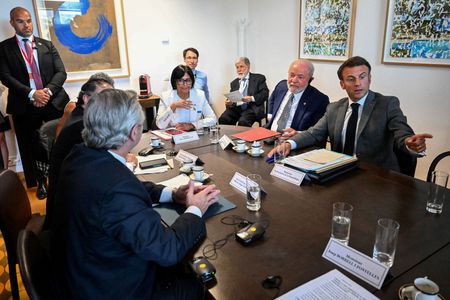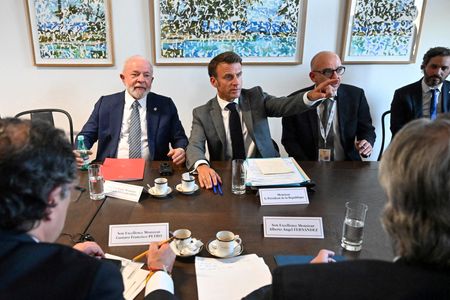By Andrew Gray and Marine Strauss
BRUSSELS (Reuters) – European, Latin American and Caribbean leaders proclaimed a new era of increased political and economic cooperation on Tuesday but their summit meeting was clouded by wrangling over how to address Russia’s war in Ukraine.
The gathering of some 50 leaders from the three regions in Brussels was intended to revitalise their relations as the EU seeks to revamp its international alliances in response to Russia’s invasion of Ukraine and a growing wariness of China.
“It’s a promising and optimistic page that is opening in relations between Latin America, the Caribbean and the European Union,” declared Charles Michel, president of the European Council, which brings together the EU’s national leaders.
But while leaders at the summit declared they share common values such as democracy, human rights and the rule of law, their struggles over the war in Ukraine highlighted differences on an issue of paramount importance to Europe.
EU officials had hoped the summit with the Community of Latin American and Caribbean States (CELAC) would clearly deplore Russia for invading its neighbour in February last year. But the final declaration did not mention Russia.
The statement expressed “deep concern on the ongoing war against Ukraine”. It said the war was causing immense human suffering constraining growth, increasing inflation, disrupting supply chains, and heightening energy and food insecurity.
Even that language was too strong for Nicaragua, ruled by former leftist guerrilla Daniel Ortega.
The statement specified that one country disagreed with one paragraph of the declaration. Officials said that referred to Nicaragua and to the paragraph on Ukraine.
Argentinian President Alberto Fernandez insisted the summit was about much more than the war, tackling issues such as climate change, trade and the fair use of natural resources.
He also recalled that many Latin American countries had condemned Russia for the invasion.
“Of course there were different voices, but it wasn’t the main item on our agenda,” he told reporters.
“It wasn’t that Latin America was reluctant to speak out against the war in Ukraine, we have done that in the United Nations,” he added.
Ralph Gonsalves, prime minister of Saint Vincent and the Grenadines, echoed that point. But he also said the West had to understand charges of hypocrisy in its stance on Ukraine.
“Historically we have had a lot of big-power activities against smaller, poorer countries – less powerful countries,” he said, citing experiences in Latin America and the Caribbean.
“When you raise certain principles of non-interference in the internal affairs, the use of force and all the rest of it, they will ignore you,” said Gonsalves, whose country holds the CELAC presidency.
“Yet some of those same countries are the ones who are raising those very principles in Ukraine,” he said. “We have to get rid of the hypocrisy.”
In an effort to address some of those concerns, the declaration said Europe’s slave-trading past inflicted “untold suffering” on millions and hinted at the need for reparations for what it described as a “crime against humanity”.
EU DRIVE
The EU’s efforts to step up cooperation with Latin America reflects a drive to seek new sources of energy and critical raw materials as it isolates Russia and to diversify its supply chains to be less dependent on China.
But EU leaders have stressed they also want a closer political partnership and to ensure partner countries benefit fairly from the extraction of resources on their territory and that the environment is protected.
“We want that our investments come with the highest environmental and social standards,” said European Commission President Ursula von der Leyen.
On the sidelines of the summit, the EU signed an agreement on critical raw materials with Chile and two pacts to cooperate on energy, with Argentina and Uruguay.
Von der Leyen said she was “very confident” that the EU would wrap up negotiations on a trade deal with the South American Mercosur bloc and on an updated version of its trade agreement with Mexico in the coming months.
(Additional reporting by Catarina Demony, Belen Carreno and Sarah Morland; Editing by William Maclean)



